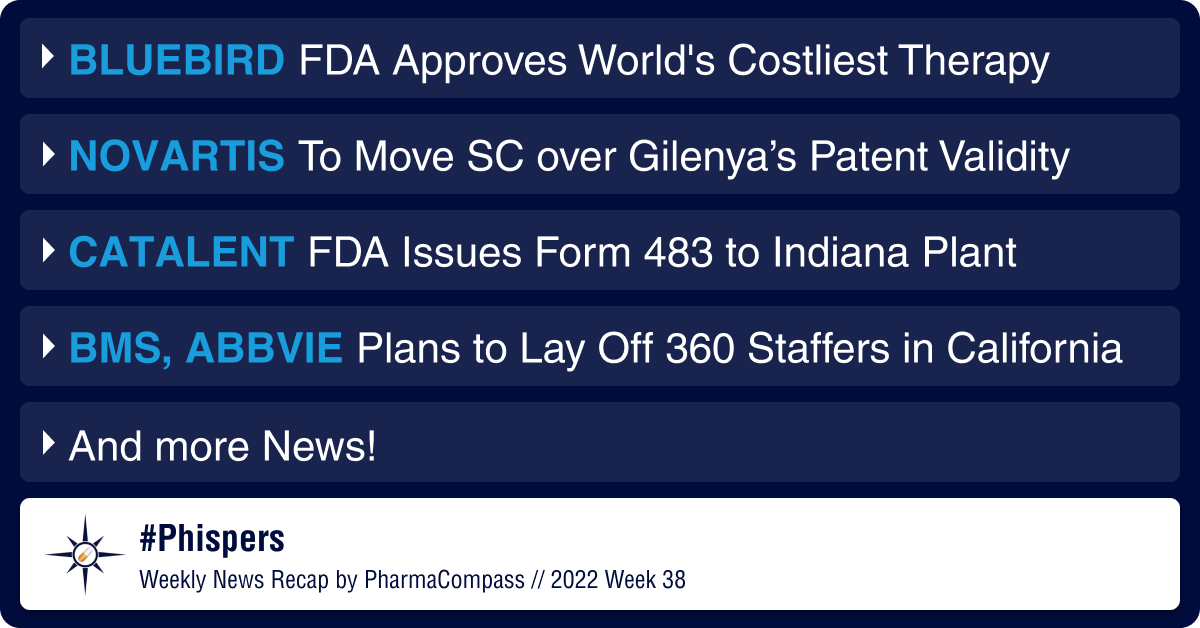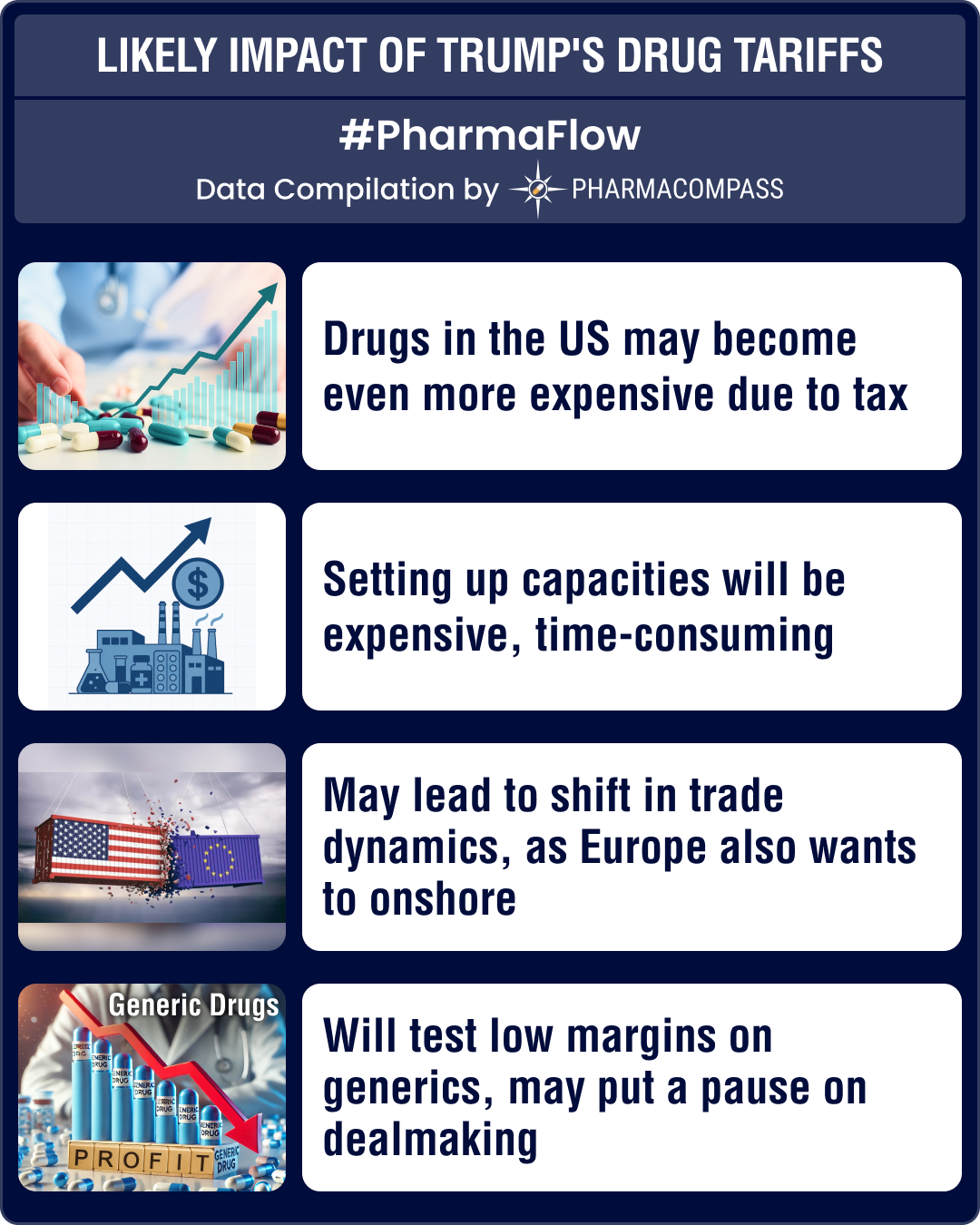
By PharmaCompass
2022-09-22
Impressions: 2,013
Exactly a month after Bluebird bio’s gene therapy Zynteglo became the most expensive treatment at US$ 2.8 million, a second therapy from the drugmaker has clinched that title. The drug – Skysona or eli-cel – approved by the US Food and Drug Administration (FDA) to treat a rare neurological disorder called cerebral adrenoleukodystrophy (CALD), will cost a whooping US$ 3 million.
The FDA also approved Mallinckrodt’s drug Terlivaz (terlipressin) for the treatment of patients with hepatorenal syndrome (HRS). And, the European Commission has authorized Roche’s Vabysmo (faricimab) to treat neovascular or wet age-related macular degeneration or nAMD and visual impairment due to diabetic macular edema (DME).
In regulatory news, the FDA has slapped a 19-page Form 483 with 12 observations to Catalent’s plant at Bloomington in Indiana, US.
After an appeals court refused to hear Novartis’ Gilenya patent cases against Chinese biotech HEC Pharma, the Swiss drugmaker said it plans to fight it out by moving the US Supreme Court.
The European Medicines Agency (EMA) has recommended the approval of AstraZeneca and Sanofi’s Beyfortus (nirsevimab) to prevent respiratory syncytial virus (RSV) infection in newborns and infants. The agency has also recommended AstraZeneca’s long-acting Covid-19 antibody combination — Evusheld — to treat Covid patients 12 years and above who do not require supplemental oxygen and who are at risk of progressing to a severe form of the disease.
Meanwhile, BMS’ blockbuster drug Opdivo has clinched a win in a late-stage trial testing the drug in an adjuvant setting for patients with completely resected stage IIB/C melanoma. And, Pfizer’s investigational pentavalent meningococcal vaccine has met all primary and secondary endpoints in a late-stage clinical trial in people between 10 and 25 years.
In negative news, Bristol Myers Squibb and AbbVie have informed the California government about their plans to lay off around 360 people by the end of November.
FDA approves world’s costliest therapy, priced at US$ 3 million, from Bluebird bio
Exactly a month after Bluebird bio’s gene therapy Zynteglo became the most expensive treatment at US$ 2.8 million, another therapy from the drugmaker has replaced it to clinch the title of the world’s priciest treatment. The drug – Skysona or eli-cel – which has been approved to treat a rare neurological disorder called cerebral adrenoleukodystrophy (CALD), will cost a whooping US$ 3 million.
CALD is caused by mutations in a gene called ABCD1. It leads to the buildup of very long-chain fatty acids in the brain and spinal cord. It affects young boys and results in severe disability or death.
Last week, the FDA granted an accelerated approval to the one-time gene therapy. The treatment “is the first FDA approved therapy shown to slow the progression of neurologic dysfunction in boys,” the company said. Bluebird, in its biologics license application (BLA), had submitted data that showed that the therapy demonstrated a survival rate of 90 percent at 24 months. The drug remains effective for about seven years.
The FDA had put a clinical hold on Skysona last year after a patient treated with the gene therapy developed myelodysplastic syndrome. While the FDA has lifted that hold, Bluebird still has to provide confirmatory data. The company plans to submit data from a long-term study that will follow clinical trial-treated patients for 15 years, along with follow-ups from patients treated commercially. And the therapy will carry a black box warning for hematologic malignancy.
Bluebird plans to launch the gene therapy in the US by the end of this year. Earlier, the biotech had withdrawn both Zynteglo and Skysona from Europe after it failed to reach reimbursement agreements with local governments.
Mallinckrodt receives FDA approval to treat life-threatening liver condition
The FDA has approved Mallinckrodt’s drug Terlivaz (terlipressin) for the treatment of patients suffering from hepatorenal syndrome (HRS), a condition where the kidneys stop working well in people with serious liver problems. Left untreated, HRS patients with rapid reduction in kidney function have a median survival time of two weeks. The condition affects between 30,000 and 40,000 people every year in the US.
The American-Irish pharma claimed that Terlivaz is the first FDA-approved product in the US for the condition. The FDA nod is based on data from a 300-patient phase 3 study, where the injection met its primary endpoint of HRS reversal. The drug will be marketed with a boxed warning of serious or even fatal respiratory failure.
While terlipressin has been the standard of care in Europe to treat the life-threatening condition for quite sometime now, an FDA approval for the drug has evaded Mallinckrodt for years.
Seagen’s Tukysa combo bags priority review: The FDA has granted a priority review to Seagen’s Tukysa (tucatinib) in combination with Genentech’s Herceptin (trastuzumab) to treat adult patients with HER2-positive metastatic colorectal cancer who have received at least one prior treatment for unresectable or metastatic disease. The agency is expected to take a decision about an accelerated approval by January 2023.
Novartis to move Supreme Court to secure validity of Gilenya patent
A federal appeals court in the US recently refused to rehear Swiss drugmaker Novartis’ Gilenya patent case against private Chinese biotech HEC Pharm. Novartis stands to lose over US$ 250 million in sales this year if generics to its blockbuster multiple sclerosis (MS) drug are allowed to hit the market.
The Swiss drugmaker intends to fight it out, and said in a statement that it plans to petition the Supreme Court to uphold the validity of its patent (number 9,187,405).
HEC had filed for approval of its Gilenya copycat in 2016 and had won approval in 2019. Novartis had promptly slapped a handful of lawsuits on HEC asserting various Gilenya patents, which expire in 2027.
Gilenya was approved in 2010 as a first-line MS treatment. The drug brought in sales of US$ 2.8 billion last year, making Gilenya Novartis’ third-highest seller in its Innovative Medicines segment.
Meanwhile, the Biden Administration has asked the Supreme Court to turn down a request by Amgen to review a decision that invalidated patents on its blockbuster cholesterol drug Repatha.
Amgen had sued Sanofi and Regeneron for patent infringement in 2014 after they sought regulatory approval for their rival drug – Praluent. Repatha brought in over US$ 1.1 billion in 2021 global sales for Amgen. The drug lowers LDL cholesterol using monoclonal antibodies.
FDA issues Form 483 with 12 observations to Catalent’s Indiana site
The FDA has slapped a 19-page Form 483 with 12 observations to Catalent’s plant at Bloomington in Indiana, US, which handles fill and finish operations as well as commercial scale biomanufacturing. The site is also a key maker of Covid-19 vaccines. The agency had inspected the site between August 1 and September 1.
FDA inspectors reported finding particulate matter in drug vials on 179 occasions. The agency’s other observations include control procedures not being established and equipment being used for unintended purposes. Quality control procedures meant to halt contamination were not being followed, and routine equipment checks were also not being performed, FDA said. The agency also pointed out Catalent’s failure to maintain records and establish lab controls.
This is not the first time that the site has received a warning from the FDA. In August 2020, inspectors had found issues around the site’s prevention of microbiological contamination.
Meanwhile, the FDA authorized 10 batches of Moderna’s updated Covid-19 booster shots made at Catalent’s Bloomington plant. The agency had been withholding the booster doses because of manufacturing issues at the plant. The facility is currently not authorized by the FDA to manufacture Moderna’s updated booster shots. The agency said it authorized the doses following Moderna’s request.
GSK’s cancer drug to be reviewed by FDA panel: An FDA committee will meet on November 22 to review whether GSK’s ovarian cancer drug Zejula should retain its approval for the maintenance treatment of adult patients with recurrent epithelial ovarian, fallopian tube or primary peritoneal cancer who are in a complete or partial response to platinum-based chemotherapy. The review will focus on the final overall survival data from a pivotal phase 3 trial. The agency had approved Zejula for the indication in 2017.
Last week, GSK wrote to doctors saying it was voluntarily withdrawing Zejula’s fourth-line indication for the treatment of adult patients with advanced ovarian, fallopian tube, or primary peritoneal cancer and whose cancer is associated with homologous recombination deficiency (HRD) positive status.
BMS, AbbVie to lay off up to 360 employees in California
Bristol Myers Squibb (BMS) and AbbVie have filed separate Worker Adjustment and Retraining Notification (WARN) notices informing the California state government that they are planning to lay off around 360 people by the end of November.
BMS said it is planning to cut up to 261 jobs from two different sites in San Diego. A company spokesperson said the job cuts are related to its US$ 4.1 billion acquisition of Turning Point Therapeutics. The company said as part of the integration, all incoming employees have received retention packages and have been encouraged to apply to long-term roles at BMS after their retention period ends.
Meanwhile, AbbVie plans to axe up to 99 jobs from an Allergan manufacturing site in Irvine, California. AbbVie had acquired the Ireland-based pharma for US$ 63 billion in 2019.
BMS’ Opdivo shows promise as adjuvant treatment for melanoma
Bristol Myers Squibb’s blockbuster drug Opdivo (nivolumab) has clinched a win in a late-stage trial testing the drug in an adjuvant setting for patients with completely resected stage IIB/C melanoma. The PD-1 drug met its primary endpoint of recurrence-free survival and showed statistically significant and clinically meaningful benefit.
Patients in the trial were either given Opdivo 480 mg doses every four weeks or placebo after surgery for up to 12 months. BMS plans to present the trial data at an upcoming conference and share it with health authorities soon. If approved, the drug will compete against Merck’s Keytruda, which received a nod from the FDA last December to treat adults and kids with stage IIB/C melanoma following complete resection.
EMA recommends AstraZeneca-Sanofi’s RSV drug for infants
The European Medicines Agency (EMA) has recommended approval of AstraZeneca and Sanofi’s Beyfortus (nirsevimab) to prevent respiratory syncytial virus (RSV) infection in newborns and infants. If approved, the drug will become the first protective option for newborns and infants against the disease.
The recommendation from the European drug regulator’s human drugs committee is based on results from multiple phase 2 and 3 clinical trials. Beyfortus, given as a single injection, met its primary endpoint in these trials, reducing the incidence of lower respiratory tract infections caused by RSV against placebo. The companies said Beyfortus reduced RSV infections requiring medical attention by 75 percent compared to a placebo. The drug was compared to AstraZeneca’s Synagis. The EMA recommendation needs to be confirmed by the European Commission, which has two months to do so.
Supports Astra’s Covid-19 antibody combo: The EMA has also recommended AstraZeneca’s long-acting Covid-19 antibody combination Evusheld (tixagevimab and cilgavimab) to treat adults and adolescents aged 12 years and above who are infected but do not require supplemental oxygen and who are at risk of progressing to a severe form of Covid-19.
Astra posts positive results for rare blood disorder drug: AstraZeneca has shared positive results for its experimental complementary treatment for paroxysmal nocturnal hemoglobinuria (PNH), a chronic and potentially life-threatening blood disorder, from a phase 3 clinical trial.
The drug, danicopan, met the primary endpoint in a phase 3 study in PNH patients who experience clinically significant extravascular hemolysis (EVH). The pharma said danicopan helped trial participants avoid blood transfusions and improved scores on a disease rating scale. When taken with Ultomiris or Soliris, the drug resulted in improved hemoglobin levels as compared to a placebo.
Roche’s eye drug authorized in Europe: The European Commission has authorized Roche’s Vabysmo (faricimab) to treat neovascular or wet age-related macular degeneration or nAMD and visual impairment due to diabetic macular edema (DME). These retinal conditions are two of the leading causes of vision loss worldwide, affecting more than 40 million people.
Vabysmo, a bispecific antibody, has become the only injectable eye medicine approved in Europe. Its approval is based on results from four phase 3 studies in the two indications, involving 3,220 patients. Apart from the EU, Vabysmo is approved in nine other countries, including the US.
Pfizer’s meningococcal vaccine meets all endpoints in phase 3 trial: Pfizer’s investigational pentavalent meningococcal vaccine has met all primary and secondary endpoints in a late-stage clinical trial in people between 10 and 25 years.
The vaccine – MenABCWY – has demonstrated non-inferiority to approved vaccines for the five most invasive meningococcal serogroups. Currently, there is no single vaccine available to protect against the five serogroups. Pfizer plans to submit a marketing application with the FDA in the last quarter of the year.
The PharmaCompass Newsletter – Sign Up, Stay Ahead
Feedback, help us to improve. Click here
Image Credit : Phisper Infographic by SCORR MARKETING & PharmaCompass license under CC BY 2.0
“ The article is based on the information available in public and which the author believes to be true. The author is not disseminating any information, which the author believes or knows, is confidential or in conflict with the privacy of any person. The views expressed or information supplied through this article is mere opinion and observation of the author. The author does not intend to defame, insult or, cause loss or damage to anyone, in any manner, through this article.”








